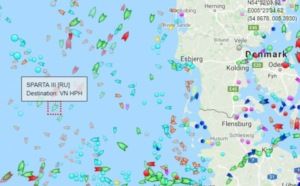News
Danish Defence: Russian ship did not breach hazardous goods rules
This article is more than 7 years old.
Misunderstanding leads to freighter being unjustly singled out yesterday

Sparta III didn’t breach the law afterall (photo: MarineTraffic.com)
The Russian ship Sparta III, which Information newspaper yesterday accused of sailing through Danish waters while hiding the fact that it was transporting dangerous weaponry from the Danish authorities, was not in breach of any maritime law.
According to Danish Defence, the freighter did actually report that it was loaded with hazardous goods – just not on the system accessible to the public.
“The ship has followed the rules to the letter and has reported as per protocol when it sailed through the Great Belt,” Frank Erland Jensen, a commander with the Joint Operations Center, told DR Nyheder.
READ MORE: Russian ships secretly transporting hazardous goods in Danish waters
Two-system confusion
The misunderstanding arose because Danish Defence operates with two different systems when it comes to the registration of shipping details – one accessible to the public, and the other not.
Ships are only required to alert the authorities of their cargo in certain areas and that occurs via the system that is not accessible to the public. It was in this system that Sparta III declared its hazardous goods cargo. It is up to the discretion of the ship’s captain whether also to register the goods in the public system and in this case, the captain did not.
“In that system [public one] the captain needs to provide some identification information about the journey, like the ports of departure and destination. He’s not obligated to provide anything else. The only place he is required to report to the Danish authorities is in the Great Belt, and he has done so,” said Jensen.










































